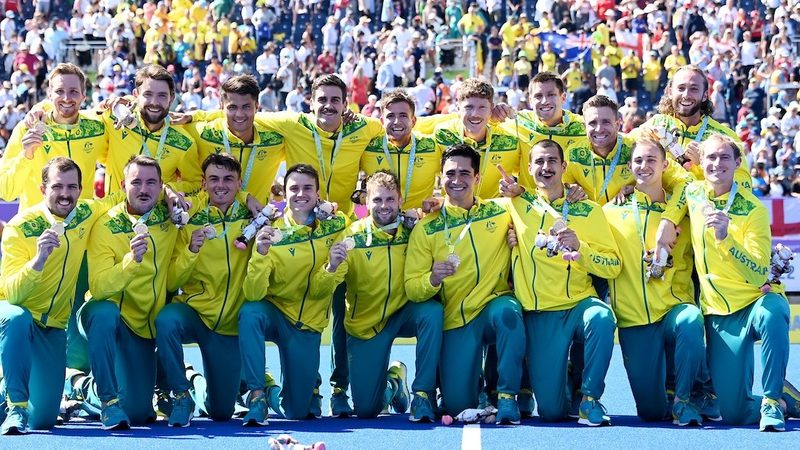
The recent Commonwealth Games in Birmingham, England and a series of test matches between Poland, Austria and Chile have made some impact upon the FIH World Rankings among both the men’s and women’s nations.
While there have been shifts and movements up and down the table, the top of the men’s and women’s rankings remains unaltered. Australia men, victors in Birmingham for the seventh consecutive time, are sitting at the top of the men’s rankings with 2851 points. Belgium (2742) and Netherlands (2646) are in second and third place.
Germany (2340) men sit in fourth place, while a silver at the Commonwealth Games helped India (2294) maintain its position in fifth, just ahead of Commonwealth Games bronze medallists England (2158) in sixth.
Argentina (2082) and Spain (1849) are in seventh and eighth position respectively, while New Zealand’s (1778) fifth place in Birmingham means the Black Sticks remain in ninth.
Further down the table, South Africa men’s (1450) impressive fourth place finish at the Commonwealth Games sees them move to 14th, one place ahead of Canada (1421). Wales (1383) remain in 16th while Pakistan’s (1333) performances over the two week long competition sees them rooted to 18th spot. Scotland (1159) are also non-shifters in 21st position.
Chile (959), Austria (1169) and Ireland (1469) are currently involved in a three-team test series. The results so far have favoured Ireland as the Green Army has moved from 14th to 13th. Austria remain in 19th place while Chile sit at 23rd.
In the women’s rankings there is no movement in the top three. Netherlands (3155) continue to top the table as they have for the past decade. Argentina (2714) are in second placed with Australia (2589) in third after a silver medal win in Birmingham.
England (2289), who won their first ever Commonwealth Games gold medal have jumped to fourth place, with Germany (2189), Belgium (2159) and Spain (2143) in fifth, sixth and seventh respectively. New Zealand’s (1995) fourth place finish hasn’t altered their position at eighth, and India (1953) are just behind in ninth position.
China (1805) make up the top 10, ahead of Asian rivals Japan (1693) and Korea (1649). Canada’s (1421) performance in Birmingham helped them move up to 14th; Scotland (1224) are unmoved at 17th and South Africa (1151) remains at 20th in the rankings. Wales (961) dropped from 23rd to 24th.
Kenya’s (604) first appearance at the Commonwealth Games saw then move up two place to 37th, after a win over neighbouring Ghana in the classification match. Ghana (684) drop one spot to 32nd.
To see the complete FIH World Rankings, please click here.
The rankings calculations model that FIH introduced on 1st January 2020 moved away from the previous tournament-based rankings system to a dynamic, match-based method where opposing teams exchange points in official, FIH sanctioned games. The number of points exchanged depends on the result of the match, the relative ranking of the teams and the importance of the match. More information about the new rankings model can be found below.
How the FIH World Rankings work:
The number of points exchanged depends on the result of the match, the relative ranking of the teams and the importance of the match.
FIH World Rankings explained:
- Based on the Elo rating system, which is used as the basis of many other sports ranking systems
- When two nations play against each other, a number of ranking points are exchanged between them
- In every match, the number of points gained by one team is exactly matched by the number of points lost by the other
- Teams will win more points for beating teams ranked above them, and therefore teams will lose more points for losing to a team ranked below them
- Teams will win less points for beating teams ranked below them, and therefore teams will lose less points for losing to a team ranked above them
- If a draw occurs, the lower ranked team will gain a small number of points and the higher ranked team will lose the same number of points
- The number of points exchanged is dependent on the result of the match (win, lose, shootout win/loss or draw), the importance of the match (part of a major tournament, or a test series for example), and the relative difference in ranking points between the teams before the match.
More details about the formula used in the algorithm, weightings of matches and other factors can be found HERE together with a Frequently Asked Questions document HERE.
For more information about FIH and hockey in general, please consult FIH.hockey, follow the FIH social media channels - Facebook, Instagram and Twit
#HWC2022
#HockeyEquals

















